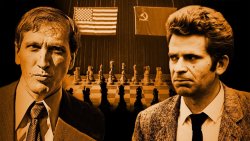
Pawns and Shadows: The Fischer-Spassky Duel and the Cold War's Secret Moves
28.02.2024 06:00 | HistoryIn the simmering cauldron of the Cold War, the 1972 World Chess Championship was not just a battleground for two of the greatest minds in chess, Bobby Fischer and Boris Spassky, but also a covert arena where the invisible hands of espionage and .....
international politics maneuvered in the shadows. This article explores the epic face-off that transcended the 64 squares of the chessboard, revealing the clandestine involvement of secret services like the KGB and the match's lasting impact beyond the realm of chess.
The 1972 World Chess Championship in Reykjavik, Iceland, was more than a mere competition; it was an emblematic clash of ideologies, pitting the solitary American genius Bobby Fischer against the Soviet chess machine's crown jewel, Boris Spassky. However, unbeknownst to many, the match also unfolded against a backdrop teeming with espionage, psychological warfare, and political intrigue, where every move and countermove had implications far beyond the chessboard.
The Grandmasters and the Grand Game
Bobby Fischer, the enigmatic American challenger, had not only the weight of the chess world on his shoulders but also the expectations of a nation seeking to prove its intellectual supremacy over the Soviet Union. Boris Spassky, the reigning world champion, was not just playing for personal glory but as a symbol of Soviet dominance in the intellectual arena. Their encounters over the board were charged with tension, each move scrutinized for signs of the psychological and strategic warfare that defined their battle.
Behind the Chessboard: The Shadow Players
What many spectators and even the players themselves may not have fully realized was the extent to which they were pawns in a much larger game played by the world's most formidable intelligence agencies. The KGB, with its vast network of spies and informants, took a keen interest in the match, seeing it as a critical front in the broader ideological struggle between East and West. Reports and rumors have since surfaced suggesting that the Soviets employed a range of tactics, from psychological operations aimed at destabilizing Fischer to more traditional espionage methods, to ensure they held the upper hand both on and off the chessboard.
Espionage and Mind Games
The match was rife with accusations and paranoia, with Fischer making numerous demands and allegations, ranging from complaints about the lighting and seating arrangements to suspicions of surveillance and tampering. While some of these claims might have seemed eccentric or unfounded at the time, they underscored the intense pressure and scrutiny the players faced, magnified by the global significance of their showdown.
The Legacy of Reykjavik
The Fischer-Spassky match did more than crown a new world champion; it highlighted the extent to which international politics and espionage could infiltrate even the most intellectual of pursuits. The victory of Fischer not only ended the Soviet Union's dominance in the world of chess but also served as a metaphorical triumph of individual genius over the collective might.
In the years that followed, the match continued to be analyzed not just for its chess brilliance but also as a case study in Cold War cultural and psychological warfare. It remains a poignant reminder of a time when two men at a chessboard could hold the world's attention, not merely as athletes but as unwitting soldiers in a much larger conflict.
This narrative aims to capture the essence of the Fischer-Spassky match, weaving together the drama of the chess battles with the intrigue of Cold War espionage. It underscores the match's significance not just in the history of chess but in the broader context of international relations and psychological warfare.
